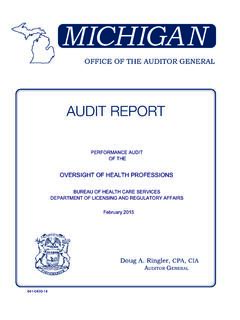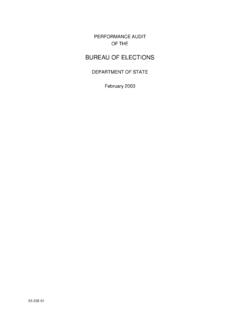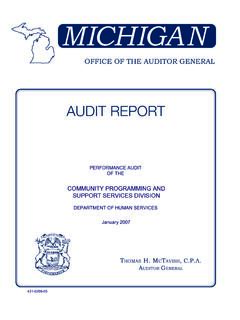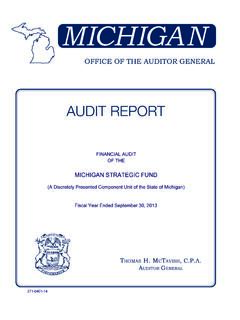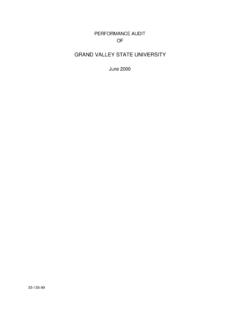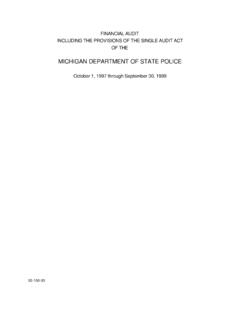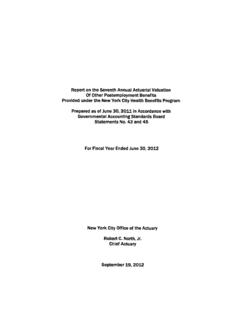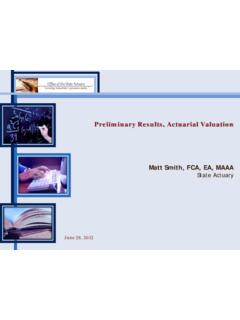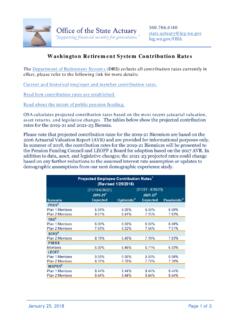Transcription of Office of the Auditor General
1 Office of the Auditor General Report on Internal Control, Compliance, and Other Matters Michigan State Employees' Retirement System Fiscal Year Ended September 30, 2016 071-0151-17 State of Michigan Auditor General Doug A. Ringler, CPA, CIA The Auditor General shall conduct post audits of financial transactions and accounts of the state and of all branches, departments, offices, boards, commissions, agencies, authorities and institutions of the state established by this constitution or by law, and performance post audits thereof. Article IV, Section 53 of the Michigan Constitution Report Summary Report on Internal Control, Compliance, and Other Matters Report Number: Michigan State Employees' Retirement System 071-0151-17 Fiscal Year Ended September 30, 2016 Released: March 2017 Generally accepted government auditing standards require an Auditor to report on internal control over financial reporting; compliance with provisions of laws, regulations, contracts, or grant agreements that have a material effect on the financial statements; and other matters coming to the attention of the Auditor during the completion of a financial audit.
2 We are issuing this report in conjunction with our independent Auditor 's report on the Michigan State Employees' Retirement System's (MSERS's) financial statements dated January 18, 2017. A copy of the full report can be obtained by calling or by visiting our Web site at: Office of the Auditor General 201 N. Washington Square, Sixth Floor Lansing, Michigan 48913 Doug A. Ringler, CPA, CIA Auditor General Laura J. Hirst, CPA Deputy Auditor General Findings Related to Internal Control, Compliance, and Other Matters Material Weakness Significant Deficiency Agency Preliminary Response The Office of Retirement Services did not have an internal control process to ensure the completeness of the defined contribution member data provided to MSERS's actuary . We estimated that the other postemployment benefits accrued liability was understated by $143 million (Finding #1). X Agrees Doug A.
3 Ringler, CPA, CIA Auditor General 201 N. Washington Square, Sixth Floor Lansing, Michigan 48913 Phone: (517) 334-8050 March 24, 2017 Ms. Laurie Hill, Chair State of Michigan Retirement Board Stevens T. Mason Building and Mr. David B. Behen, Director Department of Technology, Management, and Budget Lewis Cass Building and Ms. Kerrie L. Vanden Bosch, Director Office of Retirement Services Stevens T. Mason Building Lansing, Michigan Dear Ms. Hill, Mr. Behen, and Ms. Vanden Bosch: We have audited the basic financial statements of the Michigan State Employees' Retirement System (MSERS) as of and for the fiscal year ended September 30, 2016 and have issued a separate report thereon dated January 18, 2017. In planning and performing our audit of the financial statements, we considered MSERS's internal control over financial reporting and compliance and other matters. This is our report on internal control, compliance, and other matters of MSERS for the fiscal year ended September 30, 2016.
4 Your agency provided a preliminary response to the recommendation at the end of our fieldwork. The Michigan Compiled Laws and administrative procedures require an audited agency to develop a plan to comply with the recommendations and submit it within 60 days of the date above to the Office of Internal Audit Services, State Budget Office . Within 30 days of receipt, the Office of Internal Audit Services is required to review the plan and either accept the plan as final or contact the agency to take additional steps to finalize the plan. We appreciate the courtesy and cooperation extended to us during this audit. Sincerely, Doug Ringler Auditor General Michigan Office of the Auditor General071-0151-17 4 Michigan Office of the Auditor General071-0151-17 TABLE OF CONTENTS MICHIGAN STATE EMPLOYEES' RETIREMENT SYSTEM Page Report Summary 1 Report Letter 3 Independent Auditor 's Report on Internal Control Over Financial Reporting and on Compliance and Other Matters 8 Findings, Recommendations, and Agency Preliminary Responses 1.
5 Controls necessary to ensure completeness of data provided to actuary . 12 Glossary of Abbreviations and Terms 13 5 Michigan Office of the Auditor General071-0151-17 6 Michigan Office of the Auditor General071-0151-17 INDEPENDENT Auditor 'S REPORT ON INTERNAL CONTROL AND COMPLIANCE 7 Michigan Office of the Auditor General071-0151-17 Doug A. Ringler, CPA, CIA Auditor General 201 N. Washington Square, Sixth Floor Lansing, Michigan 48913 Phone: (517) 334-8050 Independent Auditor 's Report on Internal Control Over Financial Reporting and on Compliance and Other Matters Ms. Laurie Hill, Chair State of Michigan Retirement Board Stevens T. Mason Building and Mr. David B. Behen, Director Department of Technology, Management, and Budget Lewis Cass Building and Ms. Kerrie L. Vanden Bosch, Director Office of Retirement Services Stevens T. Mason Building Lansing, Michigan Dear Ms. Hill, Mr. Behen, and Ms. Vanden Bosch: We have audited, in accordance with the auditing standards generally accepted in the United States of America and the standards applicable to financial audits contained in Government Auditing Standards issued by the Comptroller General of the United States, the basic financial statements of the Michigan State Employees' Retirement System as of and for the fiscal year ended September 30, 2016 and the related notes to the basic financial statements and have issued our report thereon dated January 18, 2017.
6 Internal Control Over Financial Reporting In planning and performing our audit of the basic financial statements, we considered the System's internal control over financial reporting (internal control) to determine the audit procedures that are appropriate in the circumstances for the purpose of expressing our opinion on the basic financial statements, but not for the purpose of expressing an opinion on the effectiveness of the System's internal control. Accordingly, we do not express an opinion on the effectiveness of the System's internal control. A deficiency in internal control exists when the design or operation of a control does not allow management or employees, in the normal course of performing their assigned functions, to prevent, or detect and correct, misstatements on a timely basis. A material weakness is a deficiency, or a combination of deficiencies, in internal control such that there is a reasonable possibility that a material misstatement of the entity's basic financial statements will not be prevented, or detected and corrected, on a timely basis.
7 A significant deficiency is a deficiency, or a combination of deficiencies, in internal control that is less severe than a material weakness, yet important enough to merit attention by those charged with governance. Our consideration of internal control was for the limited purpose described in the first paragraph of this section and was not designed to identify all deficiencies in internal control that might be material weaknesses or significant deficiencies and, therefore, material weaknesses or significant deficiencies may exist that were not identified. Given these limitations, during our audit we did not identify any deficiencies in internal control that we consider to be material weaknesses. We did identify a deficiency in internal control, as described in Finding #1, that we consider to be a significant Office of the Auditor General071-0151-17 Compliance and Other Matters As part of obtaining reasonable assurance about whether the System's basic financial statements are free from material misstatement, we performed tests of its compliance with certain provisions of laws, regulations, contracts, and grant agreements, noncompliance with which could have a direct and material effect on the determination of financial statement amounts.
8 However, providing an opinion on compliance with those provisions was not an objective of our audit, and accordingly, we do not express such an opinion. The results of our tests disclosed no instances of noncompliance or other matters that are required to be reported under Government Auditing Standards. System's Response to Finding The System's preliminary response to the finding identified in our audit is included in the body of our report. The System's response was not subjected to the auditing procedures applied in the audit of the basic financial statements and, accordingly, we express no opinion on it. Purpose of This Report The purpose of this report is solely to describe the scope of our testing of internal control and compliance and the results of that testing, and not to provide an opinion on the effectiveness of the entity's internal control or on compliance. This report is an integral part of an audit performed in accordance with Government Auditing Standards in considering the entity's internal control and compliance.
9 Accordingly, this communication is not suitable for any other purpose. Sincerely, Doug Ringler Auditor General January 18, 2017 9 Michigan Office of the Auditor General071-0151-17 10 Michigan Office of the Auditor General071-0151-17 FINDINGS, RECOMMENDATIONS, AND AGENCY PRELIMINARY RESPONSES 11 Michigan Office of the Auditor General071-0151-17 FINDING #1 Controls necessary to ensure completeness of data provided to actuary . Incomplete member data resulted in an estimated understatement of $143 million for the MSERS other postemployment benefits accrued liability. The Office of Retirement Services (ORS) did not have an internal control* process to ensure the completeness of the defined contribution member data provided to MSERS's actuary . We estimated that the accrued liability for other postemployment benefits, which is disclosed in the notes to the financial statements, was understated by $143 million as of the September 30, 2015 actuarial valuation.
10 Governmental Accounting Standards Board* Statement No. 43, Financial Reporting for Postemployment Benefit Plans Other Than Pension Plans, requires other postemployment benefit plans to report the actuarial accrued liability in the notes to the financial statements of other postemployment benefit plans. The calculation of the actuarial accrued liability is dependent on the completeness and accuracy of the underlying plan census data. Section of the Michigan Compiled Laws requires each department to establish and maintain an internal accounting and administrative control system using generally accepted accounting principles* and including recordkeeping procedures and internal control techniques that are effective and efficient. Annually, ORS queries the Human Resources Management Network* for MSERS's defined contribution member data. ORS provides the member data to its actuary , who uses it to determine plan enrollment, actuarial accrued liability, and annual required contributions for other postemployment benefits.
